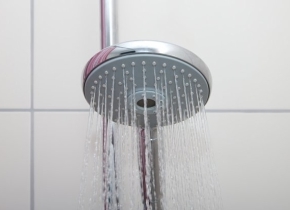

淋浴头上的智能电表鼓励酒店客人节俭 - 即使客人并没有因此而省钱。克里斯托弗·因塔利亚塔报道。
撰文\播音:克里斯托弗•因塔利亚塔(Christopher Intagliata)
翻译:Neo
审校:许楠
You've probably seen those little cards in hotel rooms: towel on the floor if you want a fresh one, towel on the rack if you'll use it again. And using towels more than once means less laundry, which saves water and energy. But you don't pay the utility bills at the hotel. So, do you really care?
你可能已经在酒店房间看到过那些小卡片:如果想要换新,请把毛巾放在在地上,如果要重复使用,请把毛巾放在架子上。多次使用毛巾意味着减少洗衣次数,从而节约水和能源。但客人其实并不不需要在酒店支付水电费。所以,你真的在乎吗?
Well: a new study in the journal Nature Energy suggests hotel guests really are motivated to conserve—for factors other than money.
《自然能源》(Nature Energy)杂志上的一项新研究表明,酒店客人会为金钱外的其他因素而愿意节俭。
"The study actually shows that even if people have zero financial benefits, they still respond to this kind of feedback for environmental reasons."
“该研究实际表明,即使人们没有获得经济收益,但出于环保原因,他们仍会对此类反馈做出回应。”
Verena Tiefenbeck studies information systems research and behavioral economics at the Swiss Federal Institute of Technology (ETH) in Zurich. Her team studied the lodger energy use issue by installing smart shower meters in six Swiss hotels—265 rooms in all.
韦雷娜·提芬贝克(Verena Tiefenbeck)在苏黎世的瑞士联邦理工学院(ETH)研究信息系统研究和行为经济学。她的团队通过六家瑞士酒店的265间客房的智能淋浴器来研究住客能源使用问题。
The meters displayed an ongoing tally of water and energy use as guests were washing up. Twenty-thousand showers later, the scientists found that their simple intervention encouraged guests to use 11 percent less energy per shower. That’s compared to guests in a control group who simply saw the water temperature displayed on the meter.
当客人洗餐具时,仪表显示了正在进行的用水和能源消耗的记录。在2万次淋浴后,科学家们发现,他们的简单干预鼓励客人每次淋浴少消耗11%的能量。实验中对照组的客人只看到了仪表上显示的水温。
Not that this finding will revolutionize the bottom line for hotels: each smart meter would save a hotel only about 20 bucks a year. But in homes, where most people take most of their showers, the savings actually could add up for the individual. And such devices could help consumers focus their efforts where they matter most.
这一发现并不会革新酒店的底线:每台智能电表每年仅能为酒店节省20美元。但是,家作为大多数人洗澡最多的场所,在家里洗澡节省下来的钱实际上可以为个人所积累。这种设备可以帮助消费者把精力集中在他们最关心的地方。
"Most people think they should switch off the lights, which isn't the most effective thing to do. And they don't know the big end users would be space heating and water heating."
“大多数人认为他们应该关灯,对节能而言,这并不是最有效的事情。他们不知道其实室内供暖和水的加热才是最耗电的。”
So now you know. Even without a smart device, if you want to cut your energy bill try lathering up just a bit faster. Of course, if you’re staying at the Bates Motel maybe skip the shower altogether.
“现在你知道了,即使没有智能设备,如果想减少你的能源账单,试着洗得更快一点。当然,如果你住在贝茨汽车旅馆,那就干脆不洗澡。
 京公网安备11010502039775号
京公网安备11010502039775号